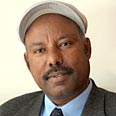
Dream of better life in Israel shattered for Ethiopian father of 8
Harsh statistics regarding poverty among Ethiopian immigrants in Israel published in Bank of Israel annual report
Negussie was referring to the chapter of the Bank of Israel report published Wednesday discussing the job market.
According to the report, unemployment among Ethiopians in Israel is twice as high as the market average and two thirds of the community's children live below the poverty line.
The bank has proposed relocating the Ethiopians to affluent towns and villages and expanding affirmative action that targets them. "We discussed all of these steps ages ago, but the government doesn't care," said Negussie.
Ynet met with one family from Beit Shemesh, the M family. Like many others, M is included in the statistics as yet another family living in poverty. The parents immigrated from Ethiopia in 2000 and lived in an absorption center until they moved to their permanent housing in Beit Shemesh.
Both are unemployed; they live off a monthly allowance from social security. After paying their 'overhead' expenses, they are left with NIS 2,000 to provide for their eight children.
"At the beginning I looked for work, but didn't find anything," said Mr. M bitterly. "Then, my health started to deteriorate. Before we came to Israel, we thought we would have a good life here. We never thought that we would not find food in Israel. We dreamed of leading a better life but we face many problems."
'It discourages the younger generation'
The M family cannot afford to buy clothes for their children. The children wear clothes from donations. The family has not had a meat meal in quite a while.
"I can only feed my family with the cheapest products that I can buy. I buy sacks of teff flour from Ethiopia so my children can eat," the father said. The imported flour is used for their staple food, injera, and is cheaper than locally produced flour.
Negussie estimates that over 80 percent of Israeli Ethiopians cannot provide for themselves. Those who do work are usually discriminated against and receive less pay than they should.
"Employers make a distinction between Ethiopians and other citizens," he said. "Sometimes I think this is done on purpose. I know of many instances when people who worked 10-12 hours received pay for less hours' work. This is especially bad in private companies and manpower agencies. It is slavery."
According to Negussie, even those who chose to acquire an academic degree cannot find work later.
"Many academics cannot find employment in their field and work as security guards or cleaners. It discourages the younger generation from trying to promote themselves.
"But the government is not concerned because we have no political power. We have no ministers of members of Knesset. The government only attends to those who speak up," he explained.










